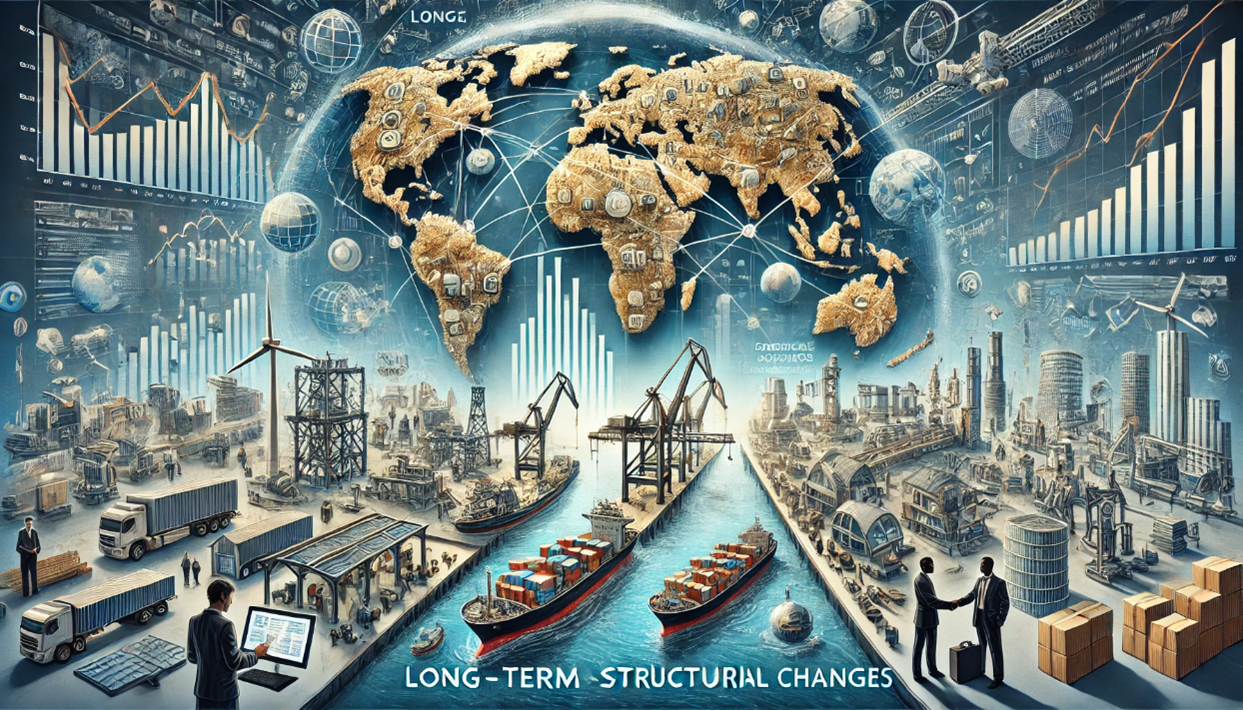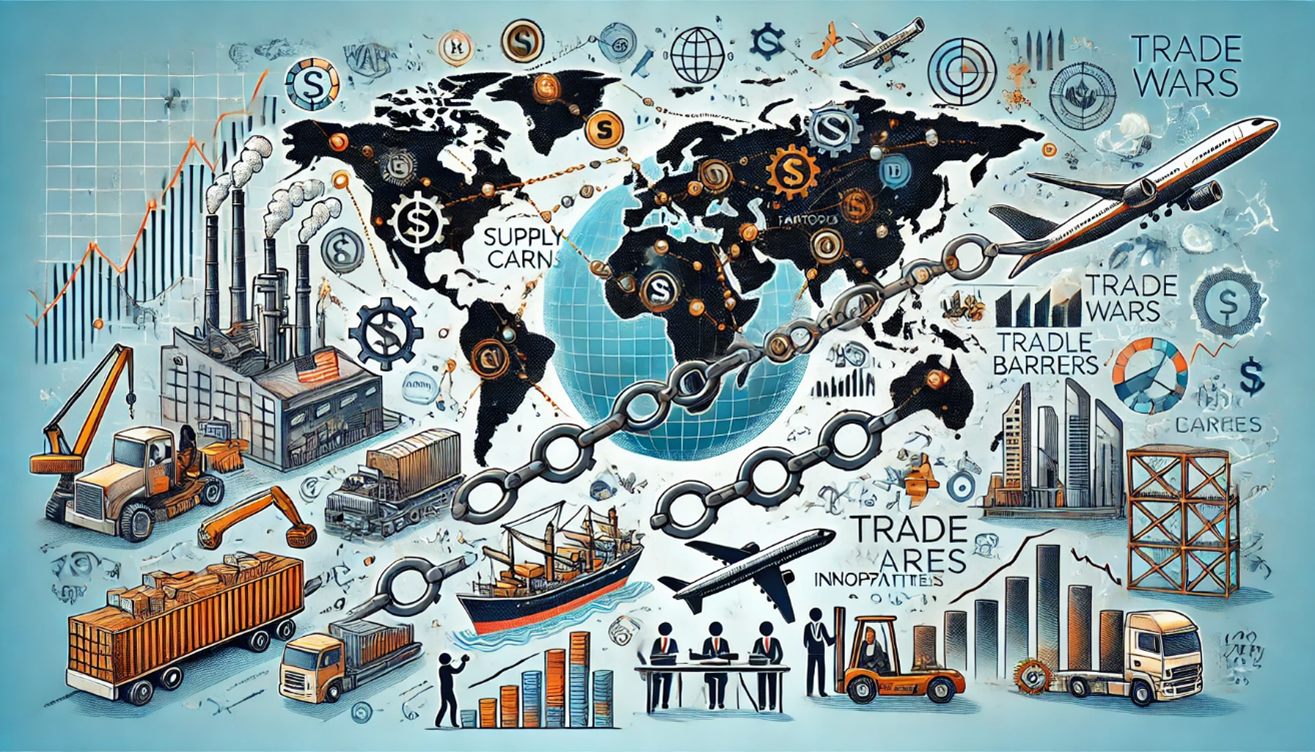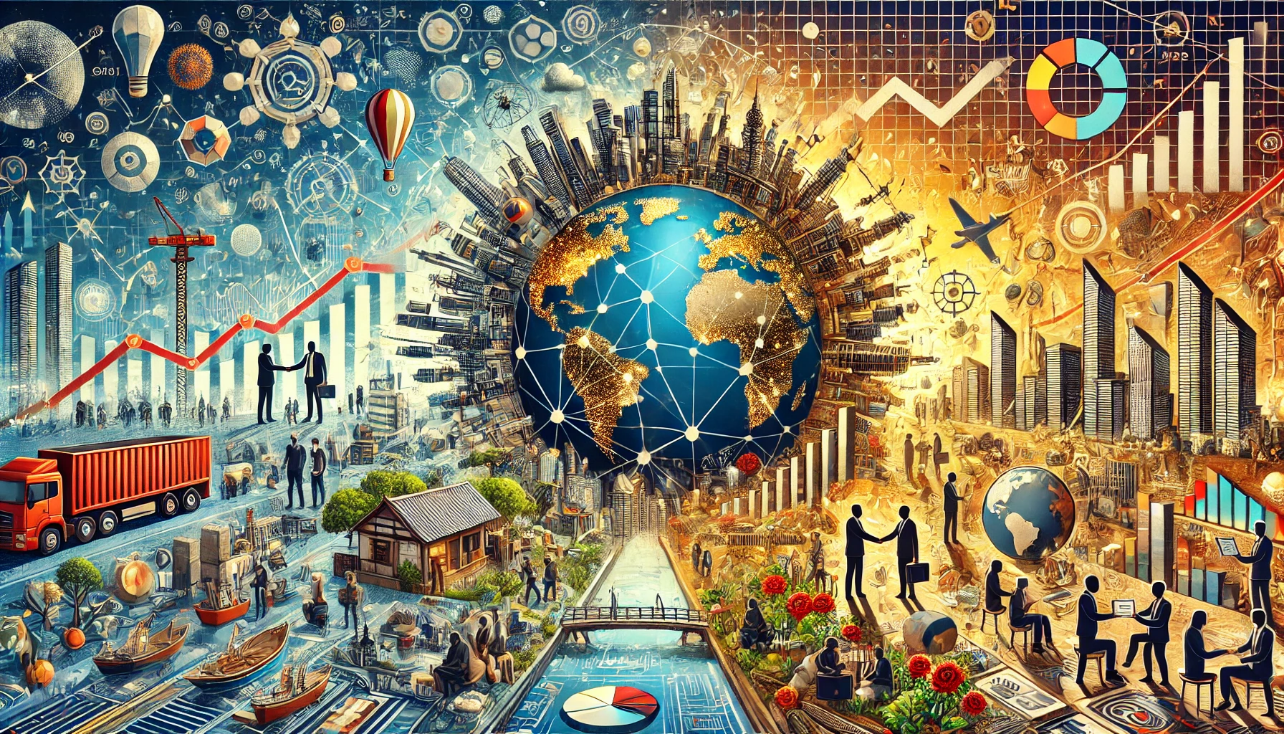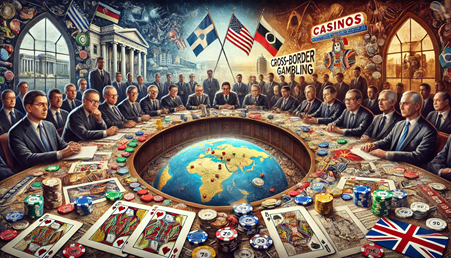How do trade wars influence global supply chains and economic development?

How do trade wars influence global supply chains and economic development?
by Nathaniel 10:53am Jan 04, 2025

How do trade wars influence global supply chains and economic development?
Trade wars have a significant and often disruptive impact on global supply chains and economic development. These conflicts arise when countries impose tariffs, quotas, or other trade barriers on each other, typically in an attempt to address trade imbalances, protect domestic industries, or retaliate against perceived unfair trade practices. The effects of trade wars ripple across supply chains, influencing production, pricing, and the broader global economy in several ways:
1. Disruption to Global Supply Chains
Increased Costs of Goods and Materials
Trade wars typically lead to higher tariffs on imported goods and materials. Companies that rely on these imports for production face increased costs, which are often passed on to consumers in the form of higher prices. For example, the U.S.-China trade war resulted in tariffs on thousands of goods, including electronics, steel, and agricultural products, leading to higher costs for manufacturers and consumers alike.
Example:Tariffs on steel and aluminum imposed by the U.S. on China, and vice versa, increased costs for industries like automotive and construction that rely on these metals.
Diversion of Supply Chains
In response to tariffs, companies often seek to mitigate the impact of trade wars by shifting their supply chains to alternative countries. For example, if a country faces tariffs on Chinese-made goods, it may look to source those goods from countries like Vietnam, India, or Mexico.
Impact:This results in a reconfiguration of supply chains and can lead to inefficiencies, as businesses have to find new suppliers, adjust their manufacturing processes, or set up new logistics networks. This reconfiguration can be costly and time-consuming.
Shortages and Delays
Trade wars can lead to shortages of certain goods and components, especially when the flow of critical materials (like microchips, raw metals, or agricultural products) is disrupted. For instance, trade barriers on Chinese electronics components or agricultural imports can create bottlenecks in industries that rely on those materials for production.
Example: The ongoing trade disputes between the U.S. and China affected industries like automotive manufacturing and consumer electronics, leading to delays and even shutdowns in production in some cases.
2. Economic Impact on Global Growth and Development
Slower Global Economic Growth
Trade wars reduce the efficiency of global trade and increase uncertainty in the market, which can slow overall economic growth. As trade becomes more expensive and complex, businesses may cut back on investment, leading to lower productivity growth. Additionally, countries involved in trade wars often experience reduced consumer confidence, which can lead to lower domestic spending and investment.
Example: During the U.S.-China trade war (2018–2020), global growth slowed, with the International Monetary Fund (IMF) downgrading its global growth projections. Disruptions in trade flows led to decreased economic output in both the U.S. and China, with knock-on effects in other countries dependent on exports.
Impact on Developing Economies
Trade wars often have an outsized impact on developing economies that are heavily reliant on exports. These countries may face a reduction in demand for their goods, especially if one of their major trade partners is involved in a conflict. For instance, countries in Asia, Africa, and Latin America that rely on exports to the U.S. or China could experience lower demand for raw materials, agricultural products, and other goods.
Example: Africa and Southeast Asia are regions that have felt the effects of trade tensions between the U.S. and China. Lower demand for commodities like oil, minerals, and agricultural products from these regions can result in slower economic growth and fewer job opportunities.
Increased Economic Inequality
Trade wars can exacerbate inequality within countries and between them. Developing countries or those with less diversified economies may be disproportionately hurt by disruptions in global trade. For example, while some industries may benefit from protectionist policies (such as domestic manufacturing), others may suffer, especially in countries that depend on exports for revenue.
Impact: In the U.S., the agricultural sector was one of the hardest-hit industries during the trade war with China, as tariffs on soybeans and other products led to significant losses for farmers. Similarly, consumers in both rich and poor countries face higher prices for goods, worsening inequality.
3. Shifts in Trade Relationships
Regionalization of Trade
In response to global trade tensions, countries often seek new trade agreements and strengthen regional ties. This has led to an increase in regional trade blocs as countries look for ways to bypass global tariffs and improve market access within specific regions.
Example: The Comprehensive and Progressive Agreement for Trans-Pacific Partnership (CPTPP) emerged after the U.S. withdrew from the Trans-Pacific Partnership (TPP). This agreement allowed countries in the Asia-Pacific region to strengthen their trade relationships and reduce reliance on U.S. imports and exports. Similarly, the European Union (EU) and Mercosur have continued to expand trade ties to mitigate the impact of global trade tensions.
Shifts Toward Protectionism
Trade wars often lead to a rise in protectionist policies, as countries seek to shield their industries from foreign competition. These protectionist measures—such as tariffs, import quotas, and export bans—can negatively impact the global economy by reducing the flow of goods and services and diminishing economic cooperation between nations.
Impact: While protectionism may temporarily protect certain domestic industries,it often leads to inefficiencies and reduced economic welfare. Over the long term, it can lead to trade fragmentation, where countries are less willing to cooperate on broader global issues, slowing overall economic progress.
4. Impact on Investment
Reduced Foreign Direct Investment (FDI)
Trade wars and increased tariffs create uncertainty, which discourages foreign direct investment (FDI). Multinational companies prefer stable trade environments where they can confidently invest in new markets, expand operations, and source materials. When trade barriers are imposed, companies may delay or cancel investments, choosing instead to focus on markets with more predictable trading conditions.
Example:China and the U.S. saw reductions in cross-border investment flows during their trade war, as businesses faced uncertainty about market access and future trade policies. Companies were also concerned about the potential costs of tariffs, leading them to divert investments elsewhere.
Shift to Nearshoring
Trade wars have accelerated the trend of nearshoring, where companies relocate their manufacturing operations closer to their primary markets to avoid tariffs and trade disruptions. This shift has been particularly evident in industries such as electronics, automotive, and apparel.
Impact: Nearshoring can lead to a reduction in the need for long, complex global supply chains. For instance, companies that previously relied on Chinese factories may move production to Mexico or Central America to avoid tariffs imposed by the U.S. This trend is reshaping global supply chains and reducing the dependence on countries involved in trade conflicts.
5. Long-Term Structural Changes in Global Trade
Innovation and Supply Chain Resilience
Over time, the disruption caused by trade wars can lead to innovation in supply chains, as companies look for ways to reduce their reliance on vulnerable regions or suppliers. Companies might invest in technology, automation, and supply chain diversification to reduce the impact of future trade conflicts.
Impact: In the long term, industries might adopt more resilient supply chain models, focusing on reducing dependencies on single countries and integrating new technologies like blockchain, AI, and automation to improve efficiency and transparency.
Conclusion
Trade wars significantly affect global supply chains and economic development, often causing disruptions, higher costs, and uncertainty. The immediate impacts are felt through the increased cost of goods, reconfiguration of supply chains, and reductions in international trade flows. In the long term, they can drive shifts in trade relationships, encourage protectionism, and alter investment patterns, ultimately slowing global economic growth. For developing economies, the consequences can be especially damaging, as they may face reduced demand for exports, higher costs of goods, and greater inequality. However, the disruption caused by trade wars also has the potential to spur innovation and the development of more resilient supply chains, as businesses seek to adapt to the changing trade environment.






